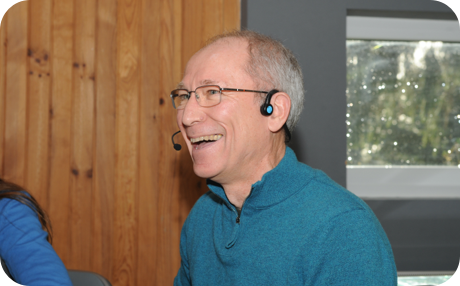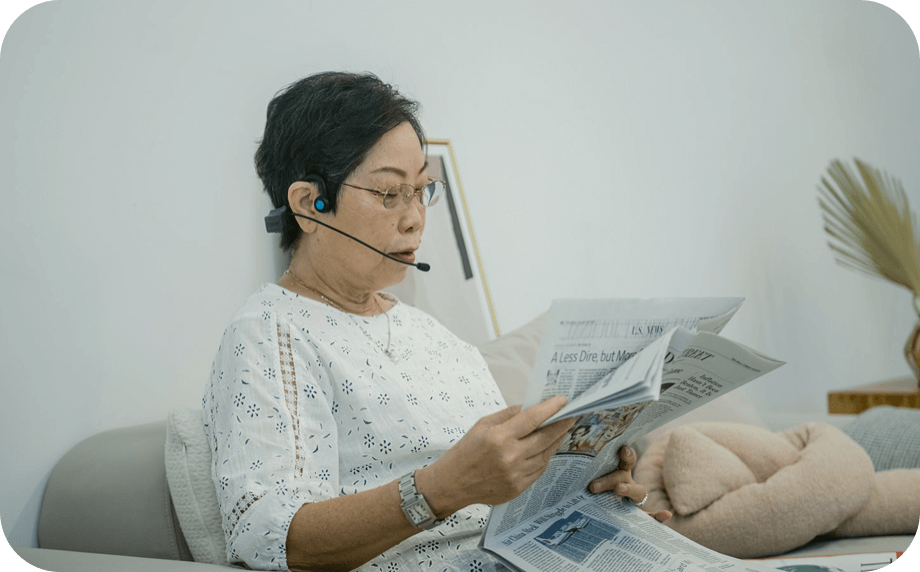Enhance 1-on-1 Conversation with Forbrain’s Personalized Pocket Talker!
Forbrain® is a personal sound Amplifier. It elevates Voice Quality and Enhances Listener Perception. Stay Engaged: Maintain Focus on Your Conversation Partner.

Promote healthy aging with Forbrain
Forbrain utilizes bone conduction technology and altered filters to provide clear and amplified auditory feedback to the user. This means that when you speak while wearing Forbrain, you hear your own voice with increased clarity and precision. In addition, the voice of your partner is also amplified with the same technology.
This immediate auditory feedback and voice perception helps you to stay more attentive and engaged in the conversation. Forbrain acts as a supportive tool for seniors, enabling them to stay focused, actively participate in conversations, and enjoy more meaningful interactions with their conversation partners.



What are the benefits?
Improved Self-Awareness
By wearing Forbrain, seniors become more aware of their own speech patterns, pronunciation, and vocal habits. This increased self-awareness allows them to make necessary adjustments and improvements in real-time.
Reduced Distractions
Forbrain’s technology helps to filter out background noise and enhance the clarity of the user’s voice. This feature is particularly beneficial for seniors who may struggle with hearing difficulties or have difficulty filtering out environmental distractions.
Stay engaged
Forbrain’s technology not only amplifies the volume but also enhances the tonal qualities and nuances of partner’s voice. This means that user can better perceive the subtle variations in pitch, intonation, and emotional expression, allowing for a more immersive and engaging conversation.
How to practice with Forbrain®
Forbrain is a versatile solution that combines brain training benefits to enhance cognitive function while simultaneously elevating the pleasure of conversation. Simply switch it on and engage in effortless and enjoyable communication with others.
Use Forbrain alone to read aloud, recite with passion, and sing along, immersing yourself in the magic of self-expression and transforming every moment into a personal masterpiece.We recommend daily use of Forbrain during regular activities for up to 20 minutes a session. If you feel comfortable, you can practice several times a day ongoing.
See Forbrain up close


Patented Dynamic FilterProcesses and produces a corrected voice

Bone Conduction TransducersEnhances sound transmission via the temporal bones

User MicrophoneCapture the sound waves of your voice

Headphone JackUsed to listen to audio recordings of training or online classes

Additional MicrophoneAmplify partner’s voice and enjoy one-on-one conversation

Patented Dynamic FilterProcesses and produces a corrected voice
Bone Conduction TransducersEnhances sound transmission via the temporal bones
User MicrophoneCapture the sound waves of your voice
Headphone JackUsed to listen to audio recordings of training or online classes
Additional MicrophoneAmplify partner’s voice and enjoy one-on-one conversation
Be inspired by our happy customers
Read about how other seniors have experienced fantastic brain training results using Forbrain.
Yes, Forbrain can be used while wearing hearing aids. It is designed to be worn over the ears, and its bone conduction technology allows sound to reach the inner ear bypassing the hearing aids.
Forbrain can be beneficial for seniors with moderate hearing loss, as it amplifies and clarifies their own voice and voice partner during conversations, making it easier for them to communicate and engage with others. However, Forbrain is not a substitute for hearing aids or professional hearing assistance devices.
Forbrain is a unique device that utilizes bone conduction technology and specialized filters to enhance speech and auditory processing. It focuses on improving speech clarity, concentration, and overall communication skills.
Keep learning about healthy aging
See our latest stories of hope and inspiration, and get tips on healthy aging with Forbrain.
All blog posts














